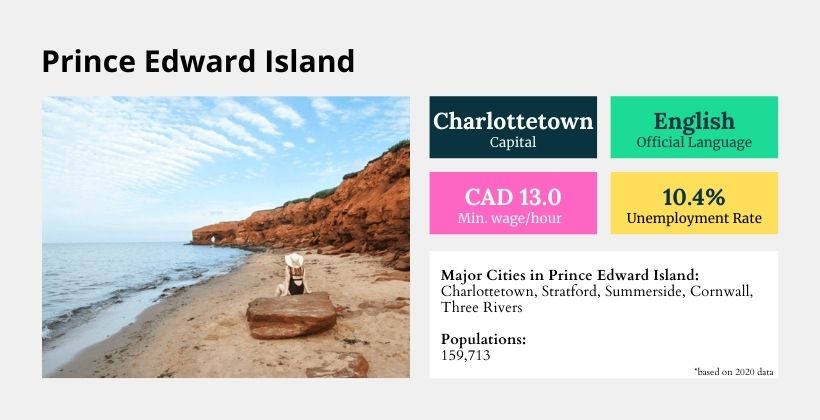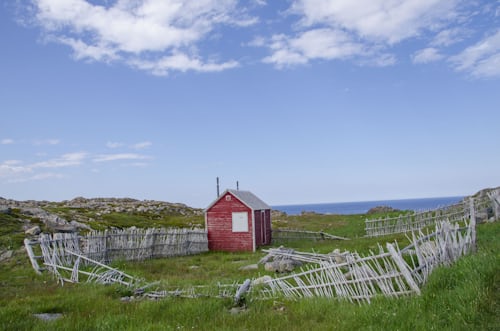PR in Prince Edward Island for International Students

Prince Edward Island is the smallest in land mass and population, but the most densely populated province in Canada, though you'd never know it. It is part of the 'Maritimes' which consists of Prince Edward Island, New Brunswick, and Nova Scotia. Although the French colonized this province in 1604, it was ceded to the British following the French Indian war.
Historically, one of Canada’s older European settlements, its current population reflects some of the earliest immigrations to the country. French, Scottish, Irish, and English surnames are prominent. It is nicknamed as “Garden of the Gulf” due to its pastoral scenery and lush agricultural lands.
If you find yourself 'seeing red' on 'The Island', don't worry since there is high iron content in the soil, which is therefore redish.

The British named this province after Prince Edward, who was the fourth son of King George III. He fathered the future Queen, Victoria. This island province is the 104th largest Island in the world and Canada’s 23rd largest Island.
Cost of living in Prince Edward Island:
The cost of living in Prince Edward Island is affordable when it comes to housing, food and even utilities. For example, the capital city of Charlottetown was ranked in 2018 as the sixth most affordable city in the whole country. One-bedroom apartment rent is usually around $550 and $800 for a three-bedroom apartment.
Student Scholarships for Prince Edward Island:
There aren’t many scholarships awarded to international students planning to enroll at undergraduate, graduate, or Ph.D. level by the PEI Provincial Government. However, there are many scholarships for domestic students. You can find more about the scholarships at:
Top Growing Industries in Prince Edward Island:
Advanced Maritime Technology
Aerospace and Defence
Bioscience
Financial and Business Services
Food Development
Information and Communications Technology
Renewable Energy
Sources: Prince Edward Island PEI.CA
Key Industries in Prince Edward Island:
Aerospace
Agriculture
Bioscience
Fisheries
Health Care
Information Technology
Renewable Resources
Tourism
Source: Prince Edward Island - key industries
Interesting facts about Prince Edward Island:
This province has no land border.
The province consists of the main island and 231 minor islands.
It is located 125 miles north of Halifax, Nova Scotia and 373 miles east of Quebec City.
The Mi’kmaq First Nations were the first to inhabit this Island and lovingly called the Island “Cradled on the waves.”
Jacques Cartier, the French explorer, discovered the island in 1534.
Nearly half of the island’s land is dedicated to Farming.
It has more than 33 golf courses.
You can find more than 90 sandy beaches on this island.
Tourism is the second-largest and fishing the third-largest industry on Prince Edward Island.
15% of the electricity used on PEI is generated from Windpower.
Cheap Universities or Colleges in Prince Edward Island:
University of Prince Edward Island
Holland College
Maritime Christian College
Collège de l’Île
PR in Prince Edward Island:
The provincial government of Prince Edward Island wants to attract the brightest and most skilled workers, who can support their economy. There are five streams.
1. Critical Workers Stream:
This stream is for employers who cannot fill vacancies through the local job market. If you are currently working on Prince Edward Island, you can apply through the Prince Edward Island Provincial Nominee Program (PEI PNP). To apply, you need:
A permanent full-time job offer from a PEI employer in an intermediate-skilled position (i.e., permanent or minimum of two years) defined by the National Occupation Code (NOC) skill level C or D;
To work a minimum of six months full-time for the PEI employer;
To demonstrate a genuine intention to settle on PEI;
To have a valid work permit and legal status in Canada;
To possess a minimum education of a secondary school diploma and be between the ages of 18 and 59;
To have a minimum full-time work experience of two years or relevant education in the past five years;
Have a minimum score of CLB/NCLC 4 from an IRCC-approved testing institute within the past two years;
And have the financial capacity to pay all immigration costs (including travel expenses) for you and your family to be able to establish yourself/yourselves on PEI.

2. Skilled Worker Outside Canada:
A PEI employer can utilize this stream to recruit talented foreigners from outside of Canada. The details of the requirements are not within the scope of this article.
3. International Graduates:
If you have graduated from a PEI publicly-funded post-secondary institution, you can apply for PR through the Prince Edward Island Provincial Nominee Program (PEI PNP). To apply, you must fulfill the requirements below. You need to have a:
Post-secondary degree or diploma from a publicly-funded institution on Prince Edward Island;
Valid post-graduating work permit and legal status in Canada;
A full-time, non-seasonal, job offer from a PEI employer (i.e., permanent or minimum of two years);
If required, you need to attend an interview with staff from the Office of Immigration for PEI;
Sufficient English (and/or French) language skill to perform the job offered and be between the ages of 18 and 59;
Have financial capacity to pay all immigration costs (including travel expenses) for you (and your family) to establish yourself (yourselves) on PEI;
Have a genuine intention to settle on PEI.
4. Skilled Workers on PEI:
If an island employer hires you, you can apply for PR through the Skilled Worker Stream of the Prince Edward Provincial Nominee Program. The detailed requirements are not within the scope of this article.
5. PEI Express Entry:
You can apply if you meet at least one of the federal skilled worker programs, federal skilled trade programs, or the Canadian Experience Class requirements. The detailed requirements are not within the scope of this article.
Helpful Resources to know more about Prince Edward Island and its Immigration Process:
International Graduates | Government of Prince Edward Island.
- Prince Edward Island - PEI.CA
International Graduates | Government of Prince Edward Island.
Discover Prince Edward Island
Navigation
# Why Canada? # Education System # Student Budget # Student permit/visa # Spousal Visa # After landing # Student Housing # Complete Checklist # Driving License # Study and Work # All Provinces in Canada # PR in Alberta # PR in British Columbia # PR in Manitoba # PR in New Brunswick # PR in NL # PR in Nova Scotia # PR in Ontario # PR in PEI # PR in Québec # PR in Saskatchewan # Cheap Universities # Cheapest Colleges # Alberta DLI # British Columbia DLI # Manitoba DLI # New Brunswick DLI # NL DLI # Nova Scotia DLI # Ontario DLI # PEI DLI # Quebec DLI # Saskatchewan DLI # Part-time jobs # Scholarships in Canada # Survive Winter

Cover Letter

Forwarding Letter

Student Financial Planning

Explanation Letter of Source of Fund

Explanation on previous Visa Rejection


